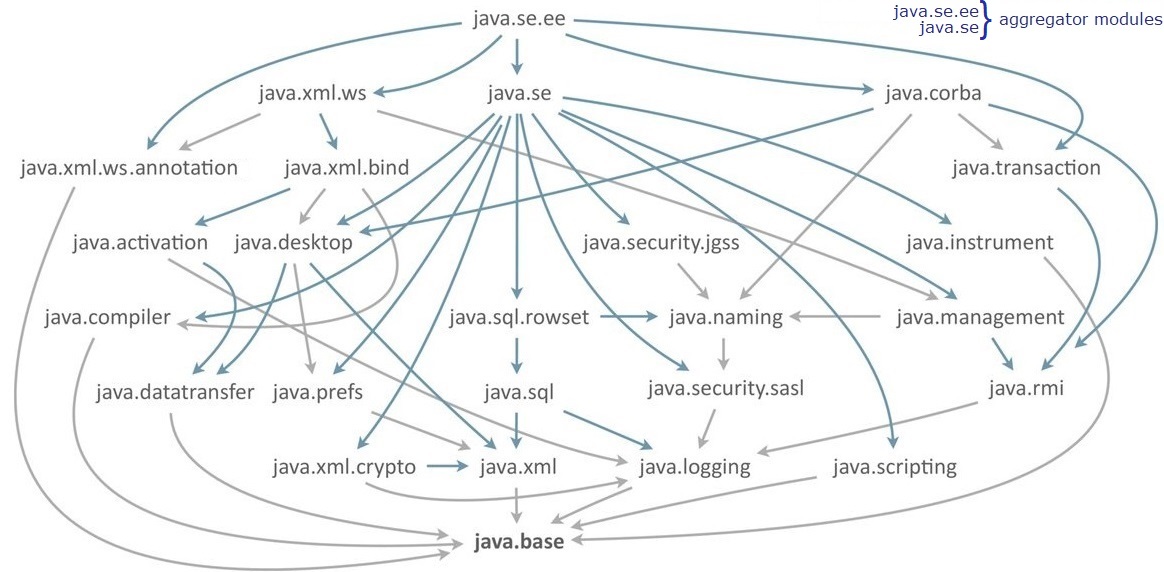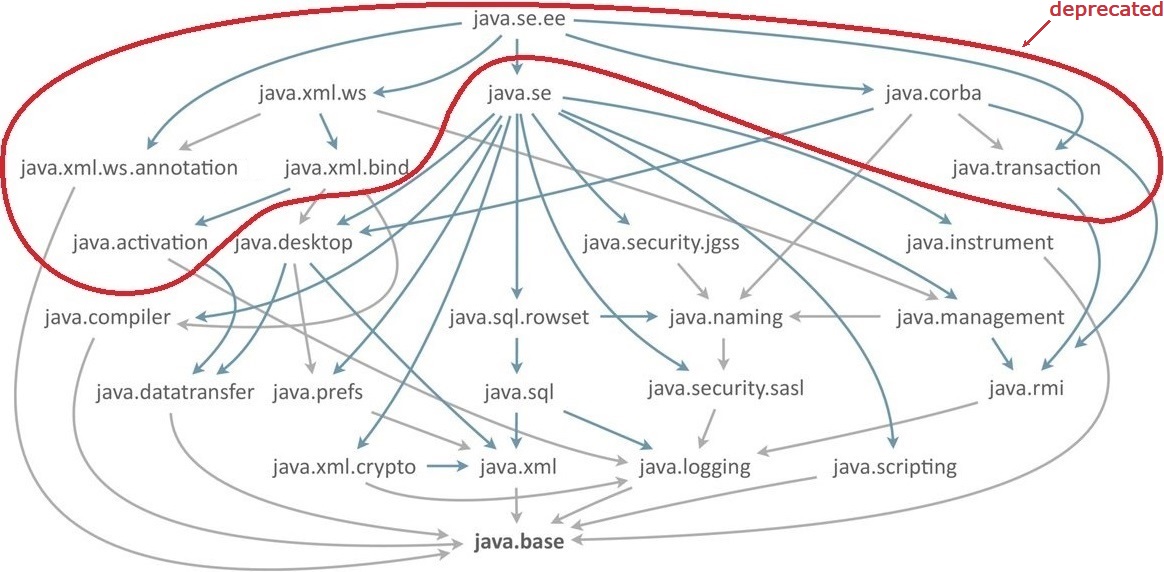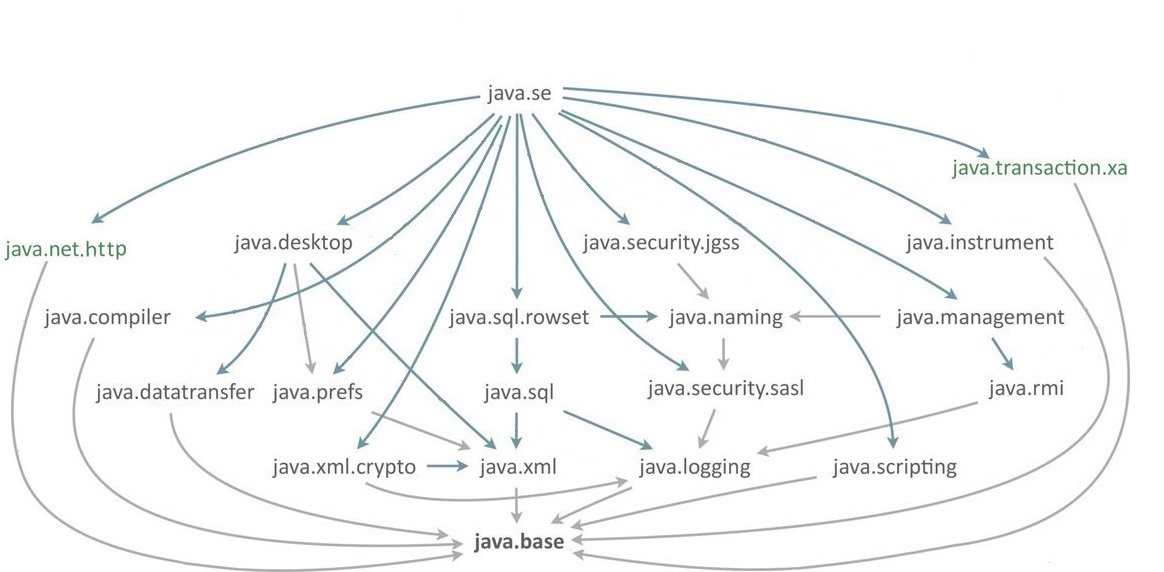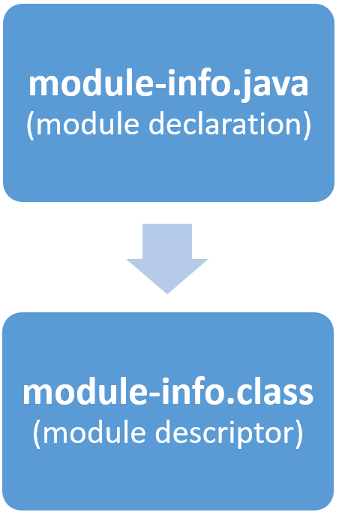
The Java Module System in practice
About me
|


Serban Iordache |
Java SE Modules (Java 9)

Adapted from: Marc Reinhold (https://twitter.com/mreinhold/status/882644292036026368)
Java SE Modules (Java 9)

Adapted from: Marc Reinhold (https://twitter.com/mreinhold/status/882644292036026368)
Java SE Modules (Java 11 and 12)

Adapted from: Marc Reinhold (https://twitter.com/mreinhold/status/882644292036026368)
Dealing with removed modules
package org.example.jpms;
import javax.xml.bind.annotation.XmlRootElement;
@XmlRootElement
public class Product {
private int id;
private String name;
private double price; // Using double for money is actually a bad idea
public Product() {
this(-1, "", 0);
}
public Product(int id, String name, double price) {
this.id = id;
this.name = name;
this.price = price;
}
public int getId() {
return id;
}
public void setId(int id) {
this.id = id;
}
public String getName() {
return name;
}
public void setName(String name) {
this.name = name;
}
public double getPrice() {
return price;
}
public void setPrice(double price) {
this.price = price;
}
@Override
public String toString() {
return name + ": " + price;
}
}Dealing with removed modules
package org.example.jpms;
import javax.xml.bind.JAXBContext;
import javax.xml.bind.Marshaller;
public class XMLPrinter {
public static void main(String[] args) throws Exception {
Product product = new Product(100, "pizza", 3.25);
JAXBContext jaxbContext = JAXBContext.newInstance(Product.class);
Marshaller jaxbMarshaller = jaxbContext.createMarshaller();
jaxbMarshaller.setProperty(Marshaller.JAXB_FORMATTED_OUTPUT, true);
jaxbMarshaller.marshal(product, System.out);
}
}Dealing with removed modules
package org.example.jpms;
import org.junit.jupiter.api.Assertions;
import org.junit.jupiter.api.Test;
public class ProductTest {
@Test
public void testToString() {
Product p = new Product(33, "spaghetti", 2.15);
Assertions.assertEquals("spaghetti: 2.15", p.toString());
}
}Dealing with removed modules
plugins {
id 'application'
}
repositories {
jcenter()
}
mainClassName = 'org.example.jpms.XMLPrinter'
dependencies {
testImplementation 'org.junit.jupiter:junit-jupiter-api:5.4.2'
testRuntimeOnly 'org.junit.jupiter:junit-jupiter-engine:5.4.2'
}
test {
useJUnitPlatform()
testLogging.showStandardStreams = true
}Replacements for removed modules
| Module name | Package | Maven artifact |
|---|---|---|
java.activation |
javax.activation.* |
com.sun.activation:javax.activation:1.2.0 |
java.corba |
javax.activity.* |
org.jboss.openjdk-orb:openjdk-orb:8.1.2.Final |
java.transaction |
javax.transaction.* |
javax.transaction:javax.transaction-api:1.3 |
java.xml.bind |
javax.xml.bind.* |
org.glassfish.jaxb:jaxb-runtime:2.3.2 |
java.xml.ws |
javax.xml.ws.* |
com.sun.xml.ws:jaxws-ri:2.3.2 |
java.xml.ws.annotation |
javax.annotation.* |
javax.annotation:javax.annotation-api:1.3.2 |
Dealing with removed modules
plugins {
id 'application'
}
repositories {
jcenter()
}
mainClassName = 'org.example.jpms.XMLPrinter'
dependencies {
testImplementation 'org.junit.jupiter:junit-jupiter-api:5.4.2'
testRuntimeOnly 'org.junit.jupiter:junit-jupiter-engine:5.4.2'
}
test {
useJUnitPlatform()
testLogging.showStandardStreams = true
}Dealing with removed modules
plugins {
id 'application'
}
repositories {
jcenter()
}
mainClassName = 'org.example.jpms.XMLPrinter'
dependencies {
implementation 'org.glassfish.jaxb:jaxb-runtime:2.3.2'
testImplementation 'org.junit.jupiter:junit-jupiter-api:5.4.2'
testRuntimeOnly 'org.junit.jupiter:junit-jupiter-engine:5.4.2'
}
test {
useJUnitPlatform()
testLogging.showStandardStreams = true
}Module descriptors

Module descriptors
module org.example.mylib {
requires java.desktop;
requires transitive java.sql;
}Module descriptors
module org.example.mylib {
requires java.desktop;
requires transitive java.sql;
exports org.example.mylib.core;
exports org.example.mylib.impl to org.example.gui;
}Module descriptors
module org.example.mylib {
requires java.desktop;
requires transitive java.sql;
exports org.example.mylib.core;
exports org.example.mylib.impl to org.example.gui;
opens org.example.mylib.model;
opens org.example.mylib.impl to java.xml.bind;
}Module descriptors
module org.example.mylib {
requires java.desktop;
requires transitive java.sql;
exports org.example.mylib.core;
exports org.example.mylib.impl to org.example.gui;
opens org.example.mylib.model;
opens org.example.mylib.impl to java.xml.bind;
uses javax.annotation.processing.Processor;
provides org.example.mylib.Solver with org.example.mylib.impl.MySolver;
}VM arguments to break encapsulation
Options for the javac and java tools:
--add-exports module/package=other-module(,other-module)*
Specifies a package to be considered as exported from its defining module to additional modules.
--add-reads module=other-module(,other-module)*
Specifies additional modules to be considered as required by a given module.
--add-opens module/package=target-module(,target-module)*
Updates module to open package to target-module, regardless of module declaration.
(has no effect on javac)
Classpath and module path
Specifying the classpath and the module-path with the javac and java tools:
| classpath | module-path |
|---|---|
|
|
Classpath and module path
You can mix --class-path and --module-path.
- modular JAR on the module-path
- modular JAR on the classpath
- non-modular JAR on the module-path
- non-modular JAR on the classpath
All code on the classpath is part of the unnamed module, which:
Automatic modules
Non-modular JARs found on the module-path are turned into automatic modules.
A module descriptor is generated on the fly
- it
requires transitiveall other resolved modules - it exports all its packages
- it reads the unnamed module
- it
Split packages
Packages are not allowed to span different modules.
Dealing with split packages using the javac and java tools:--patch-module module=file(:file)*
Merges all types from a list of artifacts into the given module.
java
--module-path ...
--add-modules ...
--patch-module java.xml.ws.annotation=/path/to/my/lib/jsr305-3.0.2.jar
--module org.example.hello/org.example.hello.HelloWorld
Building a modular application with Gradle
module org.example.jpms {
requires java.xml.bind;
opens org.example.jpms to java.xml.bind;
}Building a modular application with Gradle
package org.example.jpms;
import javax.xml.bind.JAXBContext;
import javax.xml.bind.Marshaller;
public class XMLPrinter {
public static void main(String[] args) throws Exception {
Product product = new Product(100, "pizza", 3.25);
JAXBContext jaxbContext = JAXBContext.newInstance(Product.class);
Marshaller jaxbMarshaller = jaxbContext.createMarshaller();
jaxbMarshaller.setProperty(Marshaller.JAXB_FORMATTED_OUTPUT, true);
jaxbMarshaller.marshal(product, System.out);
System.out.printf("\n\nRunning module: %s\n",
XMLPrinter.class.getModule().getName());
}
}Building a modular application with Gradle
package org.example.jpms;
import org.junit.jupiter.api.Assertions;
import org.junit.jupiter.api.Test;
public class ProductTest {
@Test
public void testToString() {
Product p = new Product(33, "spaghetti", 2.15);
Assertions.assertEquals("spaghetti: 2.15", p.toString());
System.out.printf("\n\nTesting module: %s\n",
ProductTest.class.getModule().getName());
}
}Building a modular application with Gradle
compileJava {
doFirst {
options.compilerArgs = ['--module-path', classpath.asPath]
classpath = files()
}
}
run {
doFirst {
jvmArgs = [
'--module-path', classpath.asPath,
'--add-modules', moduleName
]
classpath = files()
}
}
Building a modular application with Gradle
compileTestJava {
doFirst {
options.compilerArgs = [
'--module-path', classpath.asPath,
'--add-modules', 'org.junit.jupiter.api',
'--add-reads', "$moduleName=org.junit.jupiter.api",
'--patch-module',
"$moduleName=" + files(sourceSets.test.java.srcDirs).asPath,
]
classpath = files()
}
}Building a modular application with Gradle
test {
doFirst {
jvmArgs = [
'--module-path', classpath.asPath,
'--add-modules', 'ALL-MODULE-PATH',
'--add-reads', "$moduleName=org.junit.jupiter.api",
'--patch-module',
"$moduleName=" + files(sourceSets.test.java.outputDir).asPath,
'--add-opens',
"$moduleName/org.example.jpms=org.junit.platform.commons"
]
classpath = files()
}
}Building a modular application with Gradle
import java.util.regex.Matcher
startScripts {
doFirst {
defaultJvmOpts = [
'--module-path', 'LIB_DIR_PLACEHOLDER',
'--add-modules', moduleName,
]
}
doLast{
def bashFile = new File(outputDir, applicationName)
bashFile.text = bashFile.text.replaceFirst('LIB_DIR_PLACEHOLDER',
Matcher.quoteReplacement('$APP_HOME/lib'))
def batFile = new File(outputDir, applicationName + ".bat")
batFile.text = batFile.text.replaceFirst('LIB_DIR_PLACEHOLDER',
Matcher.quoteReplacement('%APP_HOME%\\lib'))
}
}Using Gradle with the moduleplugin
plugins {
id 'application'
id "org.javamodularity.moduleplugin" version "1.5.0"
}
repositories {
jcenter()
}
mainClassName = 'org.example.jpms/org.example.jpms.XMLPrinter'
dependencies {
implementation 'org.glassfish.jaxb:jaxb-runtime:2.3.2'
testImplementation 'org.junit.jupiter:junit-jupiter-api:5.4.2'
testRuntimeOnly 'org.junit.jupiter:junit-jupiter-engine:5.4.2'
}
test {
useJUnitPlatform()
testLogging.showStandardStreams = true
}Modular JARs compatible with Java 8 (or earlier)
1. compile all source files except module-info.java
- specify a value ≤ 8 for the
--releaseoption
2. compile module-info.java
- specify a value ≥ 9 for the
--releaseoption - include the location of the class files produced in step 1 in the value passed to the
--module-pathoption
3. create a JAR containing the class files produced in steps 1 and 2.
Maven: configure the pom.xml as shown in the documentation.
Gradle: use the org.javamodularity.moduleplugin plugin.
Modular JARs compatible with Java 8 (or earlier)
plugins {
id 'java'
id "org.javamodularity.moduleplugin" version "1.5.0"
}
modularity.mixedJavaRelease 8
repositories {
jcenter()
}
dependencies {
testImplementation 'org.junit.jupiter:junit-jupiter-api:5.4.2'
testImplementation 'org.junit.jupiter:junit-jupiter-params:5.4.2'
testRuntimeOnly 'org.junit.jupiter:junit-jupiter-engine:5.4.2'
}
test {
useJUnitPlatform()
testLogging.showStandardStreams = true
}Custom runtime images for modular applications
- jlink
-
assembles and optimizes a set of modules and their dependencies into a custom runtime image
- a custom runtime image is a special distribution containing the bare minimum to run an application.
- you can create your own JRE.
- you can use jlink only if all artifacts in the dependency graph are modularized!
Custom runtime images for modular applications
public class HelloWorldVerticle extends AbstractVerticle {
@Override
public void start(Future<Void> future) {
vertx.createHttpServer()
.requestHandler(r -> {
String name = Optional.ofNullable( r.getParam( "name" ))
.orElse( "nameless stranger" );
r.response().end ( "Hello, " + name + "!" );
})
.listen( 8080, result -> {
if ( result.succeeded() ) { future.complete(); }
else { future.fail(result.cause()); }
} );
}
}Custom runtime images for modular applications
package com.example;
import io.vertx.core.Vertx;
public class HelloWorldServer {
public static void main(final String[] args) {
Vertx vertx = Vertx.vertx();
vertx.deployVerticle( HelloWorldVerticle.class.getName() );
}
}module com.example {
requires vertx.core;
exports com.example;
}
Custom runtime images for modular applications
plugins {
id 'application'
id "org.javamodularity.moduleplugin" version "1.5.0"
}
repositories { jcenter() }
dependencies {
implementation "io.vertx:vertx-core:3.5.0"
}
mainClassName = "com.example/com.example.HelloWorldServer"
run.jvmArgs = ["--add-modules", "jdk.unsupported",
"--add-reads", "netty.common=jdk.unsupported"]Custom runtime images for modular applications
The ModiTect approach:
for each non-modularized artifact in the dependency graph:
- generate a module descriptor and add it to the artifact
ModiTect can be used with both Maven and Gradle.
Custom runtime images for modular applications
<project xmlns="http://maven.apache.org/POM/4.0.0"
xmlns:xsi="http://www.w3.org/2001/XMLSchema-instance"
xsi:schemaLocation="http://maven.apache.org/POM/4.0.0
http://maven.apache.org/xsd/maven-4.0.0.xsd">
<modelVersion>4.0.0</modelVersion>
<parent>
<groupId>org.moditect</groupId>
<artifactId>moditect-integrationtest-parent</artifactId>
<version>1.0.0-SNAPSHOT</version>
<relativePath>../pom.xml</relativePath>
</parent>
<artifactId>moditect-integrationtest-vertx</artifactId>
<packaging>jar</packaging>
<name>ModiTect Integration Test - Vert.x</name>
<properties>
<io.vertx.version>3.5.0</io.vertx.version>
<io.netty.version>4.1.15.Final</io.netty.version>
</properties>
<dependencyManagement>
<dependencies>
<dependency>
<groupId>io.vertx</groupId>
<artifactId>vertx-dependencies</artifactId>
<version>${io.vertx.version}</version>
<type>pom</type>
<scope>import</scope>
</dependency>
</dependencies>
</dependencyManagement>
<dependencies>
<dependency>
<groupId>io.vertx</groupId>
<artifactId>vertx-core</artifactId>
</dependency>
</dependencies>
<build>
<pluginManagement>
<plugins>
<plugin>
<groupId>org.apache.maven.plugins</groupId>
<artifactId>maven-compiler-plugin</artifactId>
<configuration>
<release>9</release>
<compilerArgs>
<compilerArg>--module-path</compilerArg>
<compilerArg>${project.build.directory}/modules</compilerArg>
</compilerArgs>
</configuration>
</plugin>
</plugins>
</pluginManagement>
<plugins>
<plugin>
<groupId>${project.groupId}</groupId>
<artifactId>moditect-maven-plugin</artifactId>
<executions>
<execution>
<id>add-module-info-to-dependencies</id>
<phase>package</phase>
<configuration>
<outputDirectory>
${project.build.directory}/modules
</outputDirectory>
<modules>
<module>
<artifact>
<groupId>com.fasterxml.jackson.core</groupId>
<artifactId>jackson-core</artifactId>
</artifact>
<moduleInfo>
<name>com.fasterxml.jackson.core</name>
</moduleInfo>
</module>
<module>
<artifact>
<groupId>com.fasterxml.jackson.core</groupId>
<artifactId>jackson-annotations</artifactId>
</artifact>
<moduleInfo>
<name>com.fasterxml.jackson.annotations</name>
</moduleInfo>
</module>
<module>
<artifact>
<groupId>com.fasterxml.jackson.core</groupId>
<artifactId>jackson-databind</artifactId>
</artifact>
<moduleInfo>
<name>com.fasterxml.jackson.databind</name>
</moduleInfo>
</module>
<module>
<artifact>
<groupId>io.netty</groupId>
<artifactId>netty-common</artifactId>
</artifact>
<moduleInfo>
<name>io.netty.common</name>
</moduleInfo>
</module>
<module>
<artifact>
<groupId>io.netty</groupId>
<artifactId>netty-buffer</artifactId>
</artifact>
<moduleInfo>
<name>io.netty.buffer</name>
</moduleInfo>
</module>
<module>
<artifact>
<groupId>io.netty</groupId>
<artifactId>netty-codec</artifactId>
</artifact>
<moduleInfo>
<name>io.netty.codec</name>
</moduleInfo>
</module>
<module>
<artifact>
<groupId>io.netty</groupId>
<artifactId>netty-resolver</artifactId>
</artifact>
<moduleInfo>
<name>io.netty.resolver</name>
</moduleInfo>
</module>
<module>
<artifact>
<groupId>io.netty</groupId>
<artifactId>netty-transport</artifactId>
</artifact>
<moduleInfo>
<name>io.netty.transport</name>
</moduleInfo>
</module>
<module>
<artifact>
<groupId>io.netty</groupId>
<artifactId>netty-codec-dns</artifactId>
</artifact>
<moduleInfo>
<name>io.netty.codec.dns</name>
</moduleInfo>
</module>
<module>
<artifact>
<groupId>io.netty</groupId>
<artifactId>netty-codec-http2</artifactId>
</artifact>
<moduleInfo>
<name>io.netty.codec.http2</name>
</moduleInfo>
</module>
<module>
<artifact>
<groupId>io.netty</groupId>
<artifactId>netty-resolver-dns</artifactId>
</artifact>
<moduleInfo>
<name>io.netty.resolver.dns</name>
</moduleInfo>
</module>
<module>
<artifact>
<groupId>io.netty</groupId>
<artifactId>netty-transport-native-unix-common</artifactId>
<version>${io.netty.version}</version>
</artifact>
<moduleInfo>
<name>io.netty.channel.unix</name>
</moduleInfo>
</module>
<module>
<artifact>
<groupId>io.netty</groupId>
<artifactId>netty-transport-native-epoll</artifactId>
</artifact>
<moduleInfoSource>
module io.netty.channel.epoll {
requires io.netty.buffer;
requires io.netty.channel.unix;
requires io.netty.common;
requires io.netty.transport;
exports io.netty.channel.epoll;
}
</moduleInfoSource>
</module>
<module>
<artifact>
<groupId>io.netty</groupId>
<artifactId>netty-transport-native-kqueue</artifactId>
</artifact>
<moduleInfoSource>
module io.netty.channel.kqueue {
exports io.netty.channel.kqueue;
}
</moduleInfoSource>
</module>
<module>
<artifact>
<groupId>io.netty</groupId>
<artifactId>netty-handler</artifactId>
</artifact>
<moduleInfoSource>
module io.netty.handler {
exports io.netty.handler.flow;
exports io.netty.handler.flush;
exports io.netty.handler.ipfilter;
exports io.netty.handler.logging;
exports io.netty.handler.ssl;
exports io.netty.handler.ssl.ocsp;
exports io.netty.handler.ssl.util;
exports io.netty.handler.stream;
exports io.netty.handler.timeout;
exports io.netty.handler.traffic;
}
</moduleInfoSource>
</module>
<module>
<artifact>
<groupId>io.netty</groupId>
<artifactId>netty-codec-socks</artifactId>
</artifact>
<moduleInfo>
<name>io.netty.codec.socks</name>
</moduleInfo>
</module>
<module>
<artifact>
<groupId>io.netty</groupId>
<artifactId>netty-handler-proxy</artifactId>
</artifact>
<moduleInfo>
<name>io.netty.handler.proxy</name>
</moduleInfo>
</module>
<module>
<artifact>
<groupId>io.netty</groupId>
<artifactId>netty-codec-http</artifactId>
</artifact>
<moduleInfo>
<name>io.netty.codec.http</name>
</moduleInfo>
</module>
<module>
<artifact>
<groupId>io.vertx</groupId>
<artifactId>vertx-core</artifactId>
</artifact>
<moduleInfo>
<name>io.vertx.core</name>
<requires>
static log4j.api;
static log4j;
static slf4j.api;
*;
</requires>
<exports>
!*impl*;
*;
</exports>
<uses>
io.vertx.core.spi.VertxFactory;
io.vertx.core.spi.VerticleFactory;
io.vertx.core.spi.FutureFactory;
io.vertx.core.spi.BufferFactory;
</uses>
</moduleInfo>
</module>
</modules>
<module>
<mainClass>com.example.HelloWorldServer</mainClass>
<moduleInfo>
<name>com.example</name>
<exports>
com.example to io.vertx.core;
</exports>
</moduleInfo>
</module>
</configuration>
<goals>
<goal>add-module-info</goal>
</goals>
</execution>
</executions>
</plugin>
</plugins>
</build>
<profiles>
<!-- Builds a modular runtime image -->
<profile>
<id>jlink</id>
<build>
<plugins>
<plugin>
<groupId>${project.groupId}</groupId>
<artifactId>moditect-maven-plugin</artifactId>
<executions>
<execution>
<id>create-runtime-image</id>
<phase>package</phase>
<goals>
<goal>create-runtime-image</goal>
</goals>
<configuration>
<modulePath>
<path>${project.build.directory}/modules</path>
</modulePath>
<modules>
<module>com.example</module>
</modules>
<launcher>
<name>helloWorld</name>
<module>com.example</module>
</launcher>
<compression>2</compression>
<stripDebug>true</stripDebug>
<outputDirectory>
${project.build.directory}/jlink-image
</outputDirectory>
</configuration>
</execution>
</executions>
</plugin>
</plugins>
</build>
</profile>
</profiles>
</project>Custom runtime images for modular applications
buildscript {
repositories {
maven {
url "https://plugins.gradle.org/m2/"
}
maven {
url 'https://jitpack.io'
}
}
dependencies {
classpath "org.moditect:moditect-gradle-plugin:1.0.0-beta2"
}
}
moditect {
addMainModuleInfo {
version = project.version
overwriteExistingFiles = false
jdepsExtraArgs = ['-q']
module {
mainClass = mainClassName
moduleInfo {
name = moduleName
exports = 'com.example to io.vertx.core;'
}
}
}
addDependenciesModuleInfo {
jdepsExtraArgs = ['-q']
modules {
module {
artifact "com.fasterxml.jackson.core:jackson-core:$jacksonVersion"
moduleInfo {
name = 'com.fasterxml.jackson.core'
}
}
module {
artifact "com.fasterxml.jackson.core:jackson-annotations:$jacksonVersion"
moduleInfo {
name = 'com.fasterxml.jackson.annotations'
}
}
module {
artifact "com.fasterxml.jackson.core:jackson-databind:$jacksonVersion"
moduleInfo {
name = 'com.fasterxml.jackson.databind'
}
}
module {
artifact "io.netty:netty-common:$nettyVersion"
moduleInfo {
name = 'io.netty.common'
}
}
module {
artifact "io.netty:netty-buffer:$nettyVersion"
moduleInfo {
name = 'io.netty.buffer'
}
}
module {
artifact "io.netty:netty-codec:$nettyVersion"
moduleInfo {
name = 'io.netty.codec'
}
}
module {
artifact "io.netty:netty-resolver:$nettyVersion"
moduleInfo {
name = 'io.netty.resolver'
}
}
module {
artifact "io.netty:netty-transport:$nettyVersion"
moduleInfo {
name = 'io.netty.transport'
}
}
module {
artifact "io.netty:netty-codec-dns:$nettyVersion"
moduleInfo {
name = 'io.netty.codec.dns'
}
}
module {
artifact "io.netty:netty-codec-http2:$nettyVersion"
moduleInfo {
name = 'io.netty.codec.http2'
}
}
module {
artifact "io.netty:netty-resolver-dns:$nettyVersion"
moduleInfo {
name = 'io.netty.resolver.dns'
}
}
module {
artifact "io.netty:netty-transport-native-unix-common:$nettyVersion"
moduleInfo {
name = 'io.netty.channel.unix'
}
}
module {
artifact "io.netty:netty-transport-native-epoll:$nettyVersion"
moduleInfo {
name = 'io.netty.channel.epoll'
}
}
module {
artifact "io.netty:netty-transport-native-kqueue:$nettyVersion"
moduleInfo {
name = 'io.netty.channel.kqueue'
}
}
module {
artifact "io.netty:netty-handler:$nettyVersion"
moduleInfoSource = '''
module io.netty.handler {
exports io.netty.handler.flow;
exports io.netty.handler.flush;
exports io.netty.handler.ipfilter;
exports io.netty.handler.logging;
exports io.netty.handler.ssl;
exports io.netty.handler.ssl.ocsp;
exports io.netty.handler.ssl.util;
exports io.netty.handler.stream;
exports io.netty.handler.timeout;
exports io.netty.handler.traffic;
}
'''
}
module {
artifact "io.netty:netty-codec-socks:$nettyVersion"
moduleInfo {
name = 'io.netty.codec.socks'
}
}
module {
artifact "io.netty:netty-handler-proxy:$nettyVersion"
moduleInfo {
name = 'io.netty.handler.proxy'
}
}
module {
artifact "io.netty:netty-codec-http:$nettyVersion"
moduleInfo {
name = 'io.netty.codec.http'
}
}
module {
artifact "io.vertx:vertx-core:$vertxVersion"
moduleInfo {
name = 'io.vertx.core'
requires = '''
static log4j.api;
static log4j;
static slf4j.api;
*;
'''
exports = '''
!*impl*;
*;
'''
uses = '''
io.vertx.core.spi.VertxFactory;
io.vertx.core.spi.VerticleFactory;
io.vertx.core.spi.FutureFactory;
io.vertx.core.spi.BufferFactory;
'''
}
}
}
}
createRuntimeImage {
outputDirectory = file("$buildDir/jlink-image")
modules = ['com.example']
launcher {
name = 'helloWorld'
module = 'com.example'
}
compression = 2
stripDebug = true
}
}Custom runtime images for modular applications
The "badass" approach
- Combine all non-modular artifacts into a merged module.
- Modularize the merged module.
This approach is taken by the badass-jlink Gradle plugin.
Custom runtime images for modular applications
plugins {
id 'application'
id "org.javamodularity.moduleplugin" version "1.5.0"
id 'org.beryx.jlink' version '2.10.2'
}
repositories { jcenter() }
dependencies {
implementation "io.vertx:vertx-core:3.5.0"
}
mainClassName = "com.example/com.example.HelloWorldServer"
run.jvmArgs = ["--add-modules", "jdk.unsupported",
"--add-reads", "netty.common=jdk.unsupported"]
jlink {
options = ['--strip-debug', '--compress', '2',
'--no-header-files', '--no-man-pages']
mergedModule {
additive = true
uses 'io.vertx.core.spi.VertxFactory'
uses 'io.vertx.core.spi.VerticleFactory'
uses 'io.vertx.core.spi.FutureFactory'
uses 'io.vertx.core.spi.BufferFactory'
}
}Creating application installers with jpackage
jpackage
- a tool for packaging self-contained Java applications along with a Java Runtime Environment.
- allows Java applications to be distributed, installed, and uninstalled in a manner that is familiar to users.
- based on the JavaFX
javapackagertool (removed in OpenJDK 11) - available in OpenJDK 13+
The badass-jlink plugin provides a jpackage task for creating a platform-specific application installer.
Creating application installers with jpackage
public class HelloFX extends Application {
@Override
public void start(Stage stage) {
Label label = new Label("Hello, JEEConf!");
label.setFont(Font.font(48));
StackPane pane = new StackPane(label);
Scene scene = new Scene(pane, 480, 320);
stage.setScene(scene);
stage.show();
}
public static void main(String[] args) {
launch(args);
}
}Creating application installers with jpackage
module org.example.jpms.hellofx {
requires javafx.controls;
opens org.example.jpms.hellofx to javafx.graphics;
}Creating application installers with jpackage
plugins {
id 'application'
id 'org.openjfx.javafxplugin' version '0.0.7'
id 'org.beryx.jlink' version '2.10.2'
}
repositories { jcenter() }
javafx {
modules = ['javafx.controls']
}
mainClassName = "org.example.jpms.hellofx/org.example.jpms.hellofx.HelloFX"
jlink {
options = ['--strip-debug', '--compress', '2',
'--no-header-files', '--no-man-pages']
launcher { name = 'helloFX' }
jpackage {
if (org.gradle.internal.os.OperatingSystem.current().windows) {
installerOptions = ['--win-per-user-install', '--win-dir-chooser']
}
}
}Creating application installers with jpackage
plugins {
id 'application'
id 'org.openjfx.javafxplugin' version '0.0.7'
id 'org.beryx.jlink' version '2.10.2'
}
repositories { jcenter() }
javafx {
modules = ['javafx.controls']
}
mainClassName = "org.example.jpms.hellofx/org.example.jpms.hellofx.HelloFX"
jlink {
options = ['--strip-debug', '--compress', '2',
'--no-header-files', '--no-man-pages']
launcher { name = 'helloFX' }
jpackage {
if (org.gradle.internal.os.OperatingSystem.current().windows) {
installerOptions = ['--win-per-user-install', '--win-dir-chooser']
}
}
}Creating application installers with jpackage
plugins {
id 'application'
id 'org.openjfx.javafxplugin' version '0.0.7'
id 'org.beryx.jlink' version '2.10.2'
}
repositories { jcenter() }
javafx {
modules = ['javafx.controls']
}
mainClassName = "org.example.jpms.hellofx/org.example.jpms.hellofx.HelloFX"
jlink {
options = ['--strip-debug', '--compress', '2',
'--no-header-files', '--no-man-pages']
launcher { name = 'helloFX' }
jpackage {
if (org.gradle.internal.os.OperatingSystem.current().windows) {
installerOptions = ['--win-per-user-install', '--win-dir-chooser']
}
}
}Custom runtime images for non-modular applications
Approach:
- create a custom runtime image containing only the JDK modules required by the application
- copy all the classes and dependencies along with the start scripts of your application into to the directory of the custom Java runtime image
This approach is taken by the badass-runtime Gradle plugin.
Custom runtime images for non-modular applications
plugins {
id 'application'
id "org.beryx.runtime" version "1.1.6"
}
repositories {
jcenter()
}
dependencies {
implementation "io.vertx:vertx-core:3.5.0"
}
mainClassName = "com.example.HelloWorldServer"
runtime {
options = ['--strip-debug', '--compress', '2',
'--no-header-files', '--no-man-pages']
modules = ['java.naming', 'java.compiler', 'java.logging', 'jdk.unsupported']
}Key takeaways
Resources
Code and slides of this talk: https://github.com/beryx/talk-jeeconf-2019
Maven
- Generate and add module descriptors, create modular JARs targeting Java 8 or older, create custom runtime images of modular applications: ModiTect
Gradle
- Build, test, run, create start scripts: gradle-modules-plugin
- Create custom runtime images of modular applications:
badass-jlink-plugin
moditect-gradle-plugin - Create custom runtime images of non-modular applications: badass-runtime-plugin
- Create modular JARs targeting Java 8 or older:
gradle-modules-plugin
badass-jar-plugin - Use OpenJFX: javafx-gradle-plugin
